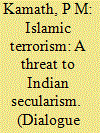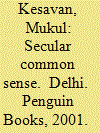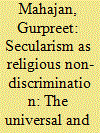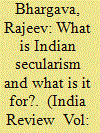| Srl | Item |
| 1 |
ID:
056842


|
|
|
| 2 |
ID:
046620


|
|
|
|
|
| Publication |
DelhI, Penguin Books, 2001.
|
| Description |
135p.
|
|
|
|
|
|
|
|
|
|
|
|
Copies: C:1/I:0,R:0,Q:0
Circulation
| Accession# | Call# | Current Location | Status | Policy | Location |
| 045879 | 211.6/KES 045879 | Main | On Shelf | General | |
|
|
|
|
| 3 |
ID:
056841


|
|
|
| 4 |
ID:
022614


|
|
|
|
|
| Publication |
Jan 2002.
|
| Description |
33-53
|
| Summary/Abstract |
Secularism everywhere represents the ideal of religious non-discrimination, but different countries pursue different paths to realize this end. Beginning with this understanding, this article rejects narratives about the uniqueness of Indian society and its conception of secularism. It elucidates the foundational principles embodied in India's constitution and argues that India chose not to follow the policy of "separation." Like many countries in Europe, India pursued religious non-discrimination by ensuring equal liberty for all communities. However, what set India apart is that equal liberty for all communities was not accompanied by a parallel strong emphasis on individual liberty. The policy of equal religious liberty was an extension of the principle of equality of all communities in the public domain. This fundamental norm is today under siege from votaries of cultural majoritarianism. What is at stake in the present-day conflict therefore is not simply religious freedom of minorities but the commitment to equality of all.
|
|
|
|
|
|
|
|
|
|
|
|
|
|
|
|
| 5 |
ID:
022613


|
|
|
|
|
| Publication |
Jan 2002.
|
| Description |
1-32
|
| Summary/Abstract |
This article challenges the argument that the conceptual and normative structure of secularism in India is itself terribly flawed. It shows that, first, ignoring the plurality within the western secular tradition, criticisms of secularism are directed against a particular, unattractive and perhaps least defensible variant of secularism for which religion must necessarily be privatized; and, second, that they wrongly identify this variant to be providing normative guidelines to the Indian state. Third, what developed in India is a distinctively Indian yet modern variant of secularism that, rather than erect a strict wall of separation, proposed a "principled distance" between religion and state. Further, by balancing the claims of individuals and religious communities, it never intended a bludgeoning privatization of religion. It also shows that a departure from a strict liberal-individualist model does not compromise the core principles of secularism
|
|
|
|
|
|
|
|
|
|
|
|
|
|
|
|